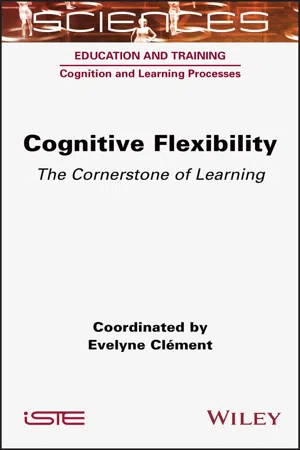1.2.1. Cognitive flexibility in everyday life
There are many times when we need to be flexible in our day-to-day lives, whether it is when we need to switch from one activity to another, or adapt to something new in our environment. For example, flexibility allows us to switch quickly between parenting and work obligations, or to stay focused on an important conversation while making dinner. It is also useful when we need to adapt to a new route to get to work in the event of traffic works taking place on our usual route. It also helps us adapt to the new layout of the shelves in our favorite store.
A great deal of research has shown that cognitive flexibility is involved in a wide range of activities and is therefore essential in being able to properly adapt to our environment and enjoy a good quality of life (Cartwright et al. 2019).
From an early age, children have a form of flexibility that will then develop with advancing age, approximately until late adolescence (Fourneret and Portes 2017). From childhood, flexibility is important. It is necessary for children when they have to adapt to a change in subject matter at school, such as moving from working on a math concept to a reading activity in an adapted and controlled way. But it can also help children learn. For example, cognitive flexibility is involved in the reading fluency of 7-year-olds, and cognitive flexibility training can improve reading fluency in 8-year-olds with reading difficulties (Cartwright et al. 2019). In addition, cognitive flexibility helps children to use imagination and creativity to solve problems (Georgsdottir and Lubart 2003).
Like other executive functions, in young children, cognitive flexibility is critical for development and can predict academic success, but also later health and income (Munakata et al. 2013). It is also highly related to self-regulation and thus social adjustment (Benson and Sabbagh 2013; Rueda and Paz-Alonso 2013). Finally, various research has shown that it can be related to the development of theory of mind (Zelazo et al. 2002; Müller et al. 2005).
While cognitive flexibility plays an important role in the successful and adapted performance of many everyday activities, these activities can also play a role in the evolution of cognitive flexibility capacities. These abilities can be improved, for example, by daily or near-daily practice of video games, especially action video games. Indeed, better cognitive flexibility could be demonstrated by comparing action video game players to non-gamers (or people who play very little). This could be done by using either a purely transversal method with the direct comparison of a group of gamers to a group of non-gamers, or a semi-experimental one, creating a control condition versus an experimental condition, in which non-gamers have to play action video games for a given time with pre- and post-test flexibility measures (Colzato 2010; Karle et al. 2010; Strobach et al. 2012; Nouchi et al. 2013; Olfers and Band 2018). A recent review of the literature confirms the beneficial effects of video games on mental flexibility (Pallavicini et al. 2018).
1.2.2. Associated pathologies
Attention Deficit Hyperactivity Disorder (ADHD) is often emblematic of pathologies that may be associated with an executive deficit (Willcutt et al. 2005). Recent research has demonstrated the usefulness of cognitive tests, including attention and executive measures, such as flexibility and inhibition to predict the diagnosis of ADHD in children aged 8–15 (Perrault et al. 2019).
Cognitive flexibility difficulties have also been shown in children with pediatric bipolar disorder (Passarotti et al. 2016). Patients with bipolar disorder have a deficit in cognitive flexibility (O’Donnell et al. 2017).
People with autism spectrum disorders also have flexibility difficulties (Hughes et al. 1994; Reed 2018). Zelazo et al. (2002) showed the possibility of predicting theory of mind difficulties in individuals with autism by their performance in cognitive flexibility.
A deficit in cognitive flexibility has also been demonstrated in depression (Gabrys et al. 2018). Many neurodegenerative diseases can be affected by a cognitive flexibility deficit, with the two most iconic being Alzheimer’s disease (Swanberg et al. 2004) and Parkinson’s disease (Lange et al. 2018).
A measure of cognitive flexibility can therefore be useful in the diagnosis of certain pathologies, whether in children or adults.
